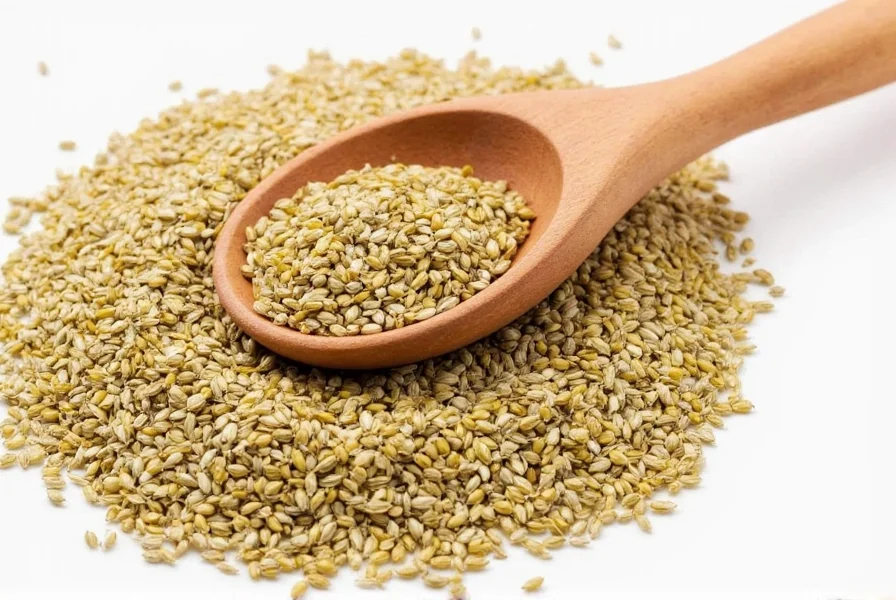The best replacements for fennel seeds are anise seeds (1:1 ratio), dill seeds (3:4 ratio), caraway seeds (1:1 ratio), and fennel pollen (1:3 ratio). Each substitute offers a unique flavor profile that works best in specific dishes like sausages, breads, or seafood recipes depending on whether you need a strong licorice note or a more subtle earthy flavor.
When your recipe calls for fennel seeds but your spice cabinet comes up empty, knowing the right replacement can save your dish. Fennel seeds provide a distinctive sweet licorice flavor with herbal notes that's essential in many Mediterranean, Indian, and Chinese cuisines. Whether you're making Italian sausage, rye bread, or pickled vegetables, understanding proper fennel seed alternatives ensures your culinary creations maintain their intended flavor profile.
Fennel seed substitutions aren't one-size-fits-all. The ideal replacement depends on your specific recipe and desired flavor intensity. Some substitutes mimic fennel's sweet licorice notes, while others offer earthier alternatives when you want to avoid the distinctive anise flavor. Let's explore the most effective options for replacing fennel seeds in various cooking applications.
Top Fennel Seed Substitutes Ranked by Flavor Match
Anise Seeds: The Closest Flavor Match
Anise seeds provide the most similar flavor profile to fennel seeds, featuring that characteristic sweet licorice note. While anise has a more intense, sharper licorice flavor than fennel, it works exceptionally well as a 1:1 replacement in most recipes. When considering fennel seed replacement in bread recipes, anise seeds create beautiful flavor in rye and pumpernickel breads. For Italian sausage making, use slightly less anise (about 3:4 ratio) since its flavor is more potent.

Dill Seeds: Best for Seafood and Pickling
Dill seeds offer a milder alternative with subtle grassy notes alongside a faint licorice undertone. This makes them an excellent fennel seed substitute for pickling recipes where you want to maintain some complexity without overwhelming licorice flavor. Use a 3:4 ratio when replacing fennel seeds with dill seeds. They work particularly well in Scandinavian gravlax, beet pickles, and cucumber relishes where fennel seeds are traditionally used.
Caraway Seeds: Earthy Alternative for Savory Dishes
Caraway seeds provide a warm, earthy flavor with mild licorice notes that work well as a 1:1 replacement in hearty dishes. While caraway has a more pronounced peppery note than fennel, it's an excellent substitute for fennel seeds in sausage recipes, particularly in German bratwurst or Hungarian dishes. The earthy profile also makes caraway a solid choice for replacing fennel seeds in bread recipes like traditional Jewish rye.
Fennel Pollen: Intensified Fennel Flavor
When you have fennel pollen but no seeds, use this golden spice at a 1:3 ratio (1 teaspoon fennel pollen replaces 1 tablespoon fennel seeds). Fennel pollen delivers a more concentrated, floral fennel flavor that works beautifully as a finishing spice. This is your best option when you need a non licorice tasting fennel seed replacement that still provides authentic fennel essence without the seed texture.
Comparing Fennel Seed Alternatives
| Substitute | Flavor Profile | Best Ratio | Ideal For | Limitations |
|---|---|---|---|---|
| Anise seeds | Strong licorice, sweet | 1:1 (slightly less for sausages) | Sausages, breads, stews | More intense flavor than fennel |
| Dill seeds | Mild licorice, grassy | 3:4 | Seafood, pickling, salads | Weaker flavor profile |
| Caraway seeds | Earthy, mild licorice, peppery | 1:1 | Savory dishes, rye bread, sauerkraut | More earthy than sweet |
| Fennel pollen | Concentrated fennel, floral | 1:3 | Finishing dishes, sauces, dressings | Expensive, subtle texture difference |
| Star anise | Strong licorice, warm | 1 star = 1 tsp seeds | Broths, braises, Chinese five-spice | Too strong for delicate dishes |
Specialized Substitutions for Specific Recipes
Best Substitute for Fennel Seeds in Sausage Making
When searching for the best substitute for fennel seeds in sausage, anise seeds provide the closest flavor match but use slightly less (about 25% less) since anise is more potent. For Italian sausage specifically, combine caraway seeds with a tiny pinch of anise for the most authentic flavor profile. Many professional charcuterie makers use this blend when fennel seeds aren't available.
Fennel Seed Replacement in Bread Recipes
Rye bread and other seeded breads rely on fennel seeds for their distinctive flavor. For these applications, caraway seeds work beautifully as a 1:1 replacement, providing similar earthy notes without overwhelming licorice flavor. If you prefer a sweeter profile closer to traditional fennel, use a 50/50 blend of anise and caraway seeds. This combination creates complex flavor in Jewish rye and pumpernickel breads when fennel seeds aren't available.
Non-Licorice Fennel Seed Alternatives
If you're looking for what can I use instead of fennel seeds without the licorice flavor, consider these options:
- Cumin - Provides earthy warmth in Indian and Middle Eastern dishes (use 3:4 ratio)
- Coriander seeds - Offers citrusy notes that work well in spice blends (1:1 ratio)
- Fennel fronds - Use fresh chopped fronds as garnish when texture isn't important
When Not to Substitute Fennel Seeds
While these alternatives work well in most situations, some recipes absolutely require authentic fennel seeds. Traditional Italian sausage, certain Indian spice blends like panch phoron, and specific pickling recipes rely on fennel's unique flavor chemistry. In these cases, it's better to omit fennel seeds entirely rather than use a substitute that alters the fundamental character of the dish.
Storage Tips for Fennel Seeds and Substitutes
Proper storage maintains the potency of both fennel seeds and their substitutes. Store all whole spices in airtight containers away from light and heat. Fennel seeds retain flavor for 1-2 years when stored properly, while anise seeds last 2-3 years. Ground spices lose potency much faster—use within 6 months for best results. For long-term storage, keep spices in the freezer where they'll maintain flavor for up to 3 years.
FAQ: Common Questions About Fennel Seed Substitutes
Can I use fennel powder instead of fennel seeds?
Yes, but use 3:4 ratio (3/4 teaspoon powder replaces 1 teaspoon seeds) since ground spices are more concentrated. Fennel powder works well in rubs and spice blends but lacks the textural element that seeds provide in breads and sausages.
What's the difference between anise and fennel seeds?
Anise seeds have a stronger, sharper licorice flavor compared to fennel's sweeter, more herbal profile. Visually, anise seeds are smaller and more oval, while fennel seeds are larger and ridged. In cooking applications, anise works as a direct substitute but use slightly less due to its more intense flavor.
Can I substitute fennel seeds with star anise?
Yes, but use sparingly—one whole star anise equals about one teaspoon of fennel seeds. Star anise provides a stronger licorice note and works best in liquid-based dishes like broths, braises, and mulled wines where the whole star can be removed after cooking. It's less suitable for dry rubs or breads.
What's the best fennel seed replacement for pickling?
Dill seeds make the best fennel seed substitute for pickling recipes, using a 3:4 ratio. They provide similar preservative qualities with a milder flavor profile that complements vinegar brines without overwhelming the vegetables. For beet pickles or cucumber relishes, dill seeds create the perfect balance of herbal notes without strong licorice flavor.
How do I make my own fennel substitute blend?
Combine 2 parts caraway seeds, 1 part anise seeds, and 1 part coriander seeds for a versatile fennel substitute blend. Toast the mixture lightly in a dry pan, then grind coarsely. This blend works particularly well as a replacement for fennel seeds in sausage recipes and hearty stews, providing complex flavor without overwhelming licorice notes.











 浙公网安备
33010002000092号
浙公网安备
33010002000092号 浙B2-20120091-4
浙B2-20120091-4